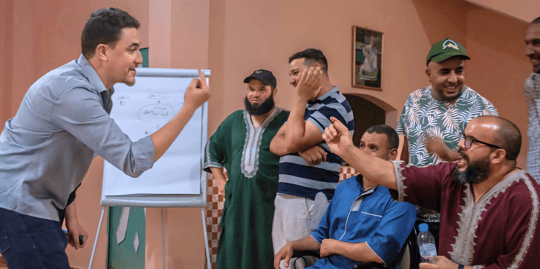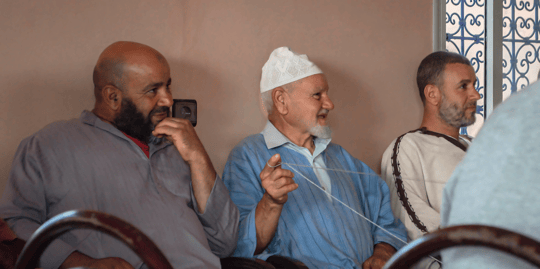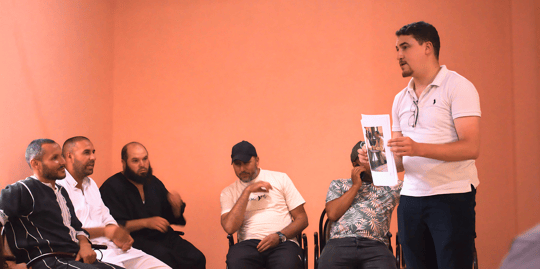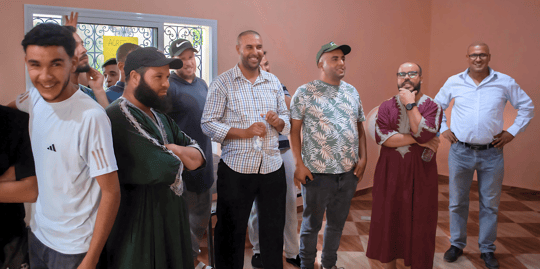The Envision Workshop: Advancing Gender Equality Through Men's Empowerment

The High Atlas Foundation (HAF) held the first session of their newly launched “Envision” program in early July in Tafza village in the Ourika commune of the Al Haouz province. Designed to be implemented alongside HAF’s successful IMAGINE women’s empowerment workshops, the Envision workshops aim to engage men in rural Moroccan communities in an empowerment journey, laying the foundation for greater participatory development. Because women’s empowerment largely depends on the support of men within families and communities, this program seeks to redefine the concept of masculinity through a more contemporary framework. By doing so, HAF hopes to contribute to more positive family upbringing and widespread gender equality to promote family well-being, community resilience, and a collective prosperity for communities across Morocco.

Workshop participants during “Building a Network” activity, Tafza Village, July 7, 2025. Photo by Reda Ben Hmidan.
From Idea to Implementation
The innovative idea for this program was developed by Professor Craig Latrell and Shannon Enders of Hamilton College in Clinton, New York, USA, with many of the activities being adapted from techniques of the “Forum Theatre” methodology. Invented by Brazilian theatre practitioner and theorist Augusto Boal (1931-2009), the Forum Theatre methodology focuses on breaking barriers between performers and audiences by giving spectators the opportunity to be directly involved in the performance rather than simply observing. In the context of the workshop, this means that participants are able to have a concrete, active role in the recognition of challenges and development of practical solutions.
In partnership with HAF, Latrell and Enders’ unique methodology for men’s empowerment has already proven to be a source of hope for widespread impact after its inaugural session in Tafza, facilitated by Mr. Abdellah Laaboudi with the assistance of his colleague, Mr. Abdelghani Kastih. The workshop was attended by 15 participants from Tafza village, varying in age from youth to men to elders. This generational diversity was a beneficial component that inspired the enriched discussions and perspectives on men’s roles within society and the family that took place throughout the two days of the workshop.
A Comprehensive Two-Day Experience
Undertaken in two sessions, over two consecutive days, the workshop consists of a series of carefully designed interactive activities aimed at exploring what it means to be a man in Morocco and focusing on building a deep understanding of what masculinity can mean in the modern world, especially in relation to family upbringing and community relations.
Day 1:
The first day was devoted to establishing the supportive environment needed for participants to feel comfortable communicating and trusting each other and their facilitators. This initial level of trust served as the foundation for the participants to then explore various concepts more deeply. The trust-building phase began with ice-breakers, including an exchange of personally significant items. While this activity initially sparked some confusion for participants due to their familiarity with more traditional notions about masculinity, they continued to show strong interest. In the end, the “Object Exchange” activity revealed deep cultural connotations among participants, reflecting both traditional masculine values associated with things like labor, as well as more modern male roles related to concepts like time and responsibility. For one participant, his chosen item revealed a connection he has to his community:
“I brought a piece of earth as my object because it means a lot to me and to the village, since we make pottery from it and also because of our farming.”
After moving into the second phase, participants began to reach a turning point. The “Values Clarification Exercise” involved having participants show their level of agreement with certain statements regarding masculinity in the Moroccan context such as, “A man must be the breadwinner for his family.” This activity allowed the participants to see what others felt, to have important discussions related to concepts like family, community, and security, and to begin to redefine what the role of a man can be in a community when stereotypes are questioned. One participant discussed how he makes an effort to raise his son to help his mother with household chores in order to “correct the path” that he took during his own upbringing. This is just one example of the fundamental shifts in thinking that began to occur towards the idea of family upbringing based on participation and cooperation. Notably, the participants affirmed that masculinity can include a range of different roles for men, transcending the traditional concepts that they may be more familiar or comfortable with.
Day 2:
The second day of the workshop focused on deepening understanding and initiating the exploration of practical solutions that can be used in daily life. After recapping the first day's progress, the facilitators transitioned into the “Building a Network” activity where participants were connected by a single string, each participant choosing another to link themselves to. At the same time, participants expressed why they chose the person and what qualities they admire most about them. The activity, highly successful in previous IMAGINE women’s empowerment workshops, allowed participants to express feelings that they might not typically outwardly express such as honesty, brotherhood, friendship, and support. The participants reported feeling “surprised that they expressed their feelings easily and smoothly,” showing that sometimes, all men need is a small push in order to open up about their feelings more freely. One participant highlighted a similar idea:
“After my father died, Omar took care of me, and that’s why I shared the string with him. Without the exercise, I would not have been able to tell him how much I appreciate him in my life.”
Once again, this activity showed the potential for masculinity to be redefined as a collective force, breaking the isolation of individual roles and emphasizing the impotence of community and fraternal bonds as an integral part of a man’s identity.

Workshop participants during the “Image Analysis” activity, Tafza village, July 2025. Photo by Reda Ben Hmidan.
Another critical component of this day’s work was the use of the “Forum Theatre” technique that was used to explore conflicts that can arise from rigid masculine roles highlighted in various scenes, comprising dialogue between two characters. In typical Forum Theatre, spectators become active participants in scenes, allowing them to become fully engaged in providing solutions or alternatives scenarios. Although this first workshop did not fully engage the participants in this way, this activity acted as a springboard for further discussion of more challenging topics.
The final activity of the day was the “Image Analysis” activity where participants analyzed images depicting men and women in different everyday activities. For example, a woman serving a group of men, or playing sport, or a man tending to a child, or cleaning the home. The purpose was to generate discussion on perceptions of gender roles. This activity was vital for better understanding how the visual messages that surround us play a large role in defining perceptions of masculinity and femininity.

Workshop participants, Tafza Village, July 2025. Photo by Reda Ben Hmidan.
Looking Forward
The workshop concluded with a period of deep reflection on how equity and mutual respect within a family contributes to strengthening of those families, as well as how relations between men and women impact the well-being of children and future generations as a whole. Participants noted that the workshop “opened their emotions, united their ranks, and made them feel the importance of viewing concepts of masculinity in positive ways that alleviate burdens and obstacles and liberate souls.” One participant said:
“Everything was great, and I came home really happy after the workshop.”
These reflections reveal the power that reframing masculinity can have, not merely as an abstract idea, but as a path to personal and family empowerment that benefits everyone and plays a vital role in sustainable development at a village level. The success seen by this first workshop shows the enormous potential of the program to expand into other villages to raise more awareness about these key issues.